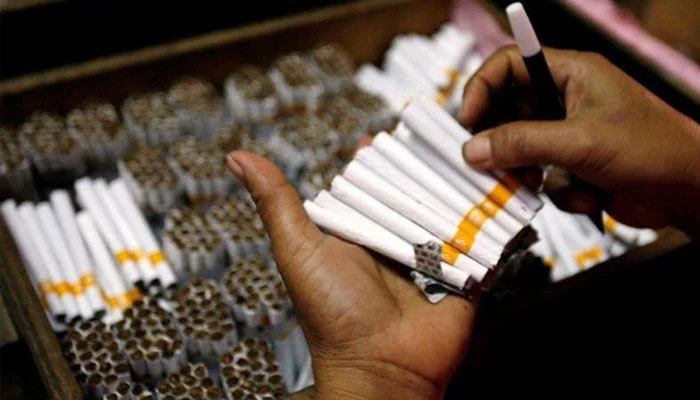Advocacy firm sees $2 billion upside by taxing shadow tobacco market
KARACHI: The country could raise an estimated Rs600 billion in the current fiscal year 2023-24 by integrating the illicit cigarette market into the tax framework, an advocacy firm said on Friday.
"The government could generate equivalent to over $2 billion, from the entire tobacco sector in FY23-24 by bringing the illicit cigarette sector into the tax net," Mustehkam Pakistan, an advocacy firm for curbing illicit trade and tax evasion in the country, said in a statement.
It said the federal government’s tax goal stands at Rs280 billion, however, an additional Rs310 billion is attainable through stringent measures against tax evasion in the tobacco industry.Due to the ongoing economic slowdown in the country and the difficulties faced by industries due to illicit trade, economic activities are being affected, the statement said. "The decrease in purchasing power and inflation, along with the prevalence of tax-evaded cheap products, is forcing people to limit their spending and shift to cheap illegal products."
In this situation, the undocumented cigarette trade is gaining momentum. Cigarettes sold at lower prices, compared to legal cigarettes by evading taxes, are among the items burdening both consumers' health and the national exchequer.Mustehkam Pakistan said the illegal sale of cigarettes has drastically increased in the current financial year due to a FED increase in February '23, while legal companies are experiencing a sharp decline in sales.
"Moreover, in order to address the current economic challenges and meet the revenue deficit, it is necessary to curb the illegal trade of cigarettes so that significant tax evasion from the illegal trade can be collected," it added.
"For this purpose, it is essential to effectively implement the scope of the track and trace system throughout the entire cigarette industry uniformly and effectively to reduce illicit cigarette trade in the country."
The country's ambitious Track and Trace System (TTS), designed to seal revenue leakages in key economic sectors, is failing to meet its objectives, with rampant tax evasion continuing unabated.
More than 18 months since its intended implementation in the tobacco industry, the TTS has not significantly curbed illicit trade. A report said that out of 100 cigarette brands surveyed, only 26 had the mandated tax stamps. Notably, certain local brands were discovered selling both stamped and unstamped cigarettes, highlighting the system's enforcement gaps.
As of now, only two cigarette manufacturers have fully adopted the TTS, contributing approximately 98 percent of the sector's tax revenue. In stark contrast, companies holding over half the market share are paying a mere 2% of taxes, exacerbating the disparity and undermining the system's efficacy.
The TTS was introduced as a structural benchmark by the International Monetary Fund (IMF) to strengthen fiscal responsibility. However, critics argue that the government's implementation has been superficial, focusing more on meeting IMF requirements than on actual enforcement.
The legitimate cigarette market has contracted to less than 40 percent, with illicit trade now accounting for over 60 percent of the sector. This shift represents a staggering loss of over Rs300 billion in potential tax revenue. Despite generating vast amounts of production data, there is little evidence of effective data analysis or utilization within the TTS framework. Without comprehensive enforcement, including at the retail level, the system remains largely ineffective. Daily, over 100 million tax-evaded cigarette sticks flood the market, with law enforcement seizures making only a negligible impact on the widespread illegal trade.
-
 EU Rejects Any Rise In US Tariffs After Court Ruling, Says ‘a Deal Is A Deal’
EU Rejects Any Rise In US Tariffs After Court Ruling, Says ‘a Deal Is A Deal’ -
 King Charles Congratulates Team GB Over Winter Olympics Success
King Charles Congratulates Team GB Over Winter Olympics Success -
 Meryl Streep Comeback In 'Mamma Mia 3' On The Cards? Studio Head Shares Promising Update
Meryl Streep Comeback In 'Mamma Mia 3' On The Cards? Studio Head Shares Promising Update -
 Woman Allegedly Used ChatGPT To Plan Murders Of Two Men, Police Say
Woman Allegedly Used ChatGPT To Plan Murders Of Two Men, Police Say -
 UK Seeks ‘best Possible Deal’ With US As Tariff Threat Looms
UK Seeks ‘best Possible Deal’ With US As Tariff Threat Looms -
 Andrew Arrest Fallout: Princess Beatrice, Eugenie Face Demands Over Dropping Royal Titles
Andrew Arrest Fallout: Princess Beatrice, Eugenie Face Demands Over Dropping Royal Titles -
 Rebecca Gayheart Breaks Silence After Eric Dane's Death
Rebecca Gayheart Breaks Silence After Eric Dane's Death -
 Kate Middleton 2026 BAFTA Dress Honours Queen Elizabeth Priceless Diamonds
Kate Middleton 2026 BAFTA Dress Honours Queen Elizabeth Priceless Diamonds -
 Sterling K. Brown's Wife Ryan Michelle Bathe Reveals Initial Hesitation Before Taking On New Role
Sterling K. Brown's Wife Ryan Michelle Bathe Reveals Initial Hesitation Before Taking On New Role -
 BAFTA Film Awards Winners: Complete List Of Winners
BAFTA Film Awards Winners: Complete List Of Winners -
 Millie Bobby Brown On Her Desire To Have A Big Brood With Husband Jake Bongiovi
Millie Bobby Brown On Her Desire To Have A Big Brood With Husband Jake Bongiovi -
 Backstreet Boys Admit Aging Changed Everything Before Shows
Backstreet Boys Admit Aging Changed Everything Before Shows -
 Biographer Exposes Aftermath Of Meghan Markle’s Emotional Breakdown
Biographer Exposes Aftermath Of Meghan Markle’s Emotional Breakdown -
 Ryan Coogler Makes Rare Statements About His Impact On 'Black Cinema'
Ryan Coogler Makes Rare Statements About His Impact On 'Black Cinema' -
 Rising Energy Costs Put UK Manufacturing Competitiveness At Risk, Industry Groups Warn
Rising Energy Costs Put UK Manufacturing Competitiveness At Risk, Industry Groups Warn -
 Kate Middleton Makes Glitzy Return To BAFTAs After Cancer Diagnosis
Kate Middleton Makes Glitzy Return To BAFTAs After Cancer Diagnosis




